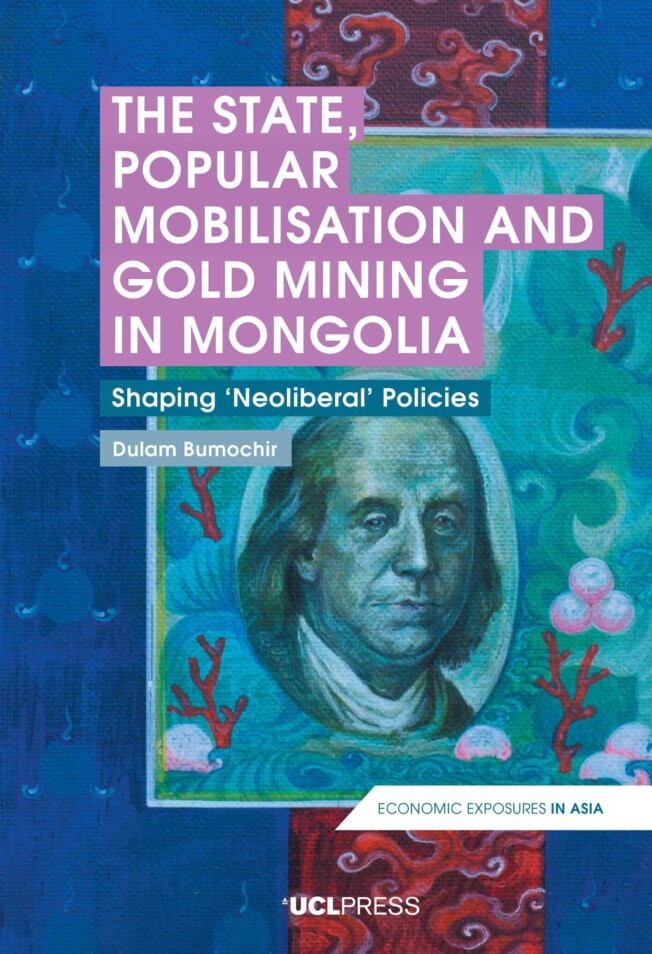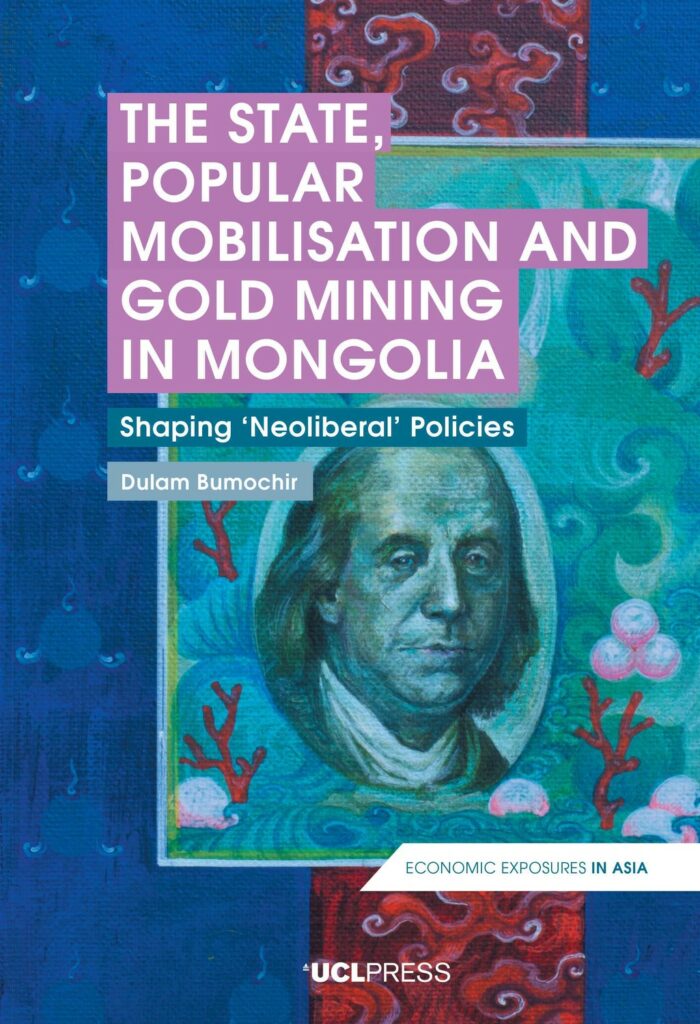
The State, Popular Mobilisation and Gold Mining in Mongolia
Shaping ‘Neoliberal’ Policies
Dulam Bumochir (Author)
Series: Economic Exposures in Asia
Mongolia’s mining sector, along with its environmental and social costs, have been the subject of prolonged and heated debate. This debate has often cast the country as either a victim of the ‘resource curse’ or guilty of ‘resource nationalism’.
In The State, Popular Mobilisation and Gold Mining in Mongolia, Dulam Bumochir aims to avoid the pitfalls of this debate by adopting an alternative theoretical approach. He focuses on the indigenous representations of nature, environment, economy, state and sovereignty that have triggered nationalist and statist responses to the mining boom. In doing so, he explores the ways in which these responses have shaped the apparently ‘neo-liberal’ policies of twenty-first century Mongolia, and the economy that has emerged from them, in the face of competing mining companies, protest movements, international donor organizations, economic downturn, and local and central government policies.
Applying rich ethnography to a nuanced and complex picture, Bumochir’s analysis is essential reading for students and researchers studying the environment and mining, especially in Central and North East Asia and post-Soviet regions, and also for readers interested in the relationship between neoliberalism, nationalism, environmentalism and state.
Praise for The State, Popular Mobilisation and Gold Mining in Mongolia
‘Engaging and comprehensive reading. This book appeals a great deal to both academic and non-academic readers.’
*Études mongoles et sibériennes, centrasiatiques et tibétaines
- ‘… gives a fascinating insight into the emergence and evolution of the Ongi River Movement and its leader, Ts. Munkhbayar, into the policy-making process and into attempts to regulate the mining economy and capitalism in Mongolia.’
Nomadic Peoples
‘this work is an important contribution to different topics in the broader social movement literature, such as the recent debate on discursive opportunity structures and anti-mining movements’
Mobilization: An International Quarterly
‘A delightful and clear read’
Journal of the Royal Anthropological Society (JRAI)
Preface
Introduction
1. The Reification of the National Economy
2. Beyond ‘Resource Nationalism’
3. Navigating Nationalist and Statist Initiatives
4. Advocacy and Activism in Popular Mobilisations
5. The De-deification of the State
6. An Original Environmentalist Society
Conclusion
References
Index 155
DOI: 10.14324/111.9781787351837
Number of pages: 232
Publication date: 31 March 2020
PDF ISBN: 9781787351837
EPUB ISBN: 9781787351868
Hardback ISBN: 9781787351851
Paperback ISBN: 9781787351844
Dulam Bumochir (Author)
Dulam Bumochir completed his PhD in Philology at Mongolian Academy of Sciences in 2000, and in Social Anthropology at Cambridge University in 2006. He has been conducting research on wide range of topics exploring folk and shamanic practices, rituals and chants, and tracing historical construction of Mongolian concept ‘shamanism’ and ‘shamanic religion’. In work on Qinghai, North West of China, he looked at ethnic politics, power of respect in the social production of identity, politics and state.
‘… gives a fascinating insight into the emergence and evolution of the Ongi River Movement and its leader, Ts. Munkhbayar, into the policy-making process and into attempts to regulate the mining economy and capitalism in Mongolia.’ Nomadic Peoples
‘Engaging and comprehensive reading. This book appeals a great deal to both academic and non-academic readers.’
Études mongoles et sibériennes, centrasiatiques et tibétaines
‘this work is an important contribution to different topics in the broader social movement literature, such as the recent debate on discursive opportunity structures and anti-mining movements’
Mobilization: An International Quarterly
‘A delightful and clear read’
Journal of the Royal Anthropological Society (JRAI)
Related titles
Environment and Post-Soviet Transformation in Kazakhstan’s Aral Sea Region
William Wheeler,
25 October 2021
The State, Popular Mobilisation and Gold Mining in Mongolia
Shaping ‘Neoliberal’ Policies
Mongolia’s mining sector, along with its environmental and social costs, have been the subject of prolonged and heated debate. This debate has often cast the country as either a victim of the ‘resource curse’ or guilty of ‘resource nationalism’.
In The State, Popular Mobilisation and Gold Mining in Mongolia, Dulam Bumochir aims to avoid the pitfalls of this debate by adopting an alternative theoretical approach. He focuses on the indigenous representations of nature, environment, economy, state and sovereignty that have triggered nationalist and statist responses to the mining boom. In doing so, he explores the ways in which these responses have shaped the apparently ‘neo-liberal’ policies of twenty-first century Mongolia, and the economy that has emerged from them, in the face of competing mining companies, protest movements, international donor organizations, economic downturn, and local and central government policies.
Applying rich ethnography to a nuanced and complex picture, Bumochir’s analysis is essential reading for students and researchers studying the environment and mining, especially in Central and North East Asia and post-Soviet regions, and also for readers interested in the relationship between neoliberalism, nationalism, environmentalism and state.
Praise for The State, Popular Mobilisation and Gold Mining in Mongolia
‘Engaging and comprehensive reading. This book appeals a great deal to both academic and non-academic readers.’
*Études mongoles et sibériennes, centrasiatiques et tibétaines
- ‘… gives a fascinating insight into the emergence and evolution of the Ongi River Movement and its leader, Ts. Munkhbayar, into the policy-making process and into attempts to regulate the mining economy and capitalism in Mongolia.’
Nomadic Peoples
‘this work is an important contribution to different topics in the broader social movement literature, such as the recent debate on discursive opportunity structures and anti-mining movements’
Mobilization: An International Quarterly
‘A delightful and clear read’
Journal of the Royal Anthropological Society (JRAI)
‘… gives a fascinating insight into the emergence and evolution of the Ongi River Movement and its leader, Ts. Munkhbayar, into the policy-making process and into attempts to regulate the mining economy and capitalism in Mongolia.’ Nomadic Peoples
‘Engaging and comprehensive reading. This book appeals a great deal to both academic and non-academic readers.’
Études mongoles et sibériennes, centrasiatiques et tibétaines
‘this work is an important contribution to different topics in the broader social movement literature, such as the recent debate on discursive opportunity structures and anti-mining movements’
Mobilization: An International Quarterly
‘A delightful and clear read’
Journal of the Royal Anthropological Society (JRAI)

